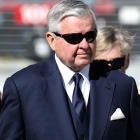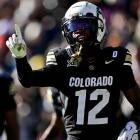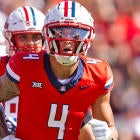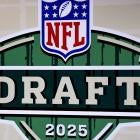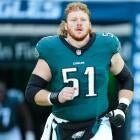To understand why Jerry Richardson decided to pull the shocking move of removing general manager Dave Gettleman a mere eight days before the Panthers begin training camp at Wofford College in Spartanburg, S.C., you need to go all the way back to 2011. Fresh off a vitriol-filled lockout that would compress the offseason and eventually pave way for the current CBA, the Panthers spent the offseason doling out massive contracts to in-house veterans.
These deals were a surprise, because Richardson, who was one of the primary faces of the lockout for his terse negotiations with the likes of Drew Brees and Tom Brady, had spent the two years leading up to the lockout keeping the purse strings tight as possible in anticipation of an ugly labor battle. Former GM Marty Hurney gets the "credit" for the contracts handed out, but it is widely believed Richardson was adamant about paying some of the players who had been with the franchise for the long haul, providing them lockout reparations of a sort.
Running back DeAngelo Williams got a five-year, $43 million deal. Linebacker James Anderson got $21 million guaranteed over five years. Thomas Davis, then coming off multiple ACL injuries, signed a five-year, $36.5 million deal. Charles Johnson received a mind-blowing $72 million over six years to keep him from leaving for the Falcons. Current CBS Sports colleague Jon Beason received a five-year, $50 million contract, making him the highest-paid middle linebacker in NFL history (we should have known Beason would be great at the media thing -- he broke the news on Twitter back in 2011 before athletes even did such things).
These were not bad deals for bad players. But in many cases they were contracts loaded with unnecessary financial risk and, rather quickly, they helped to put the Panthers in a precarious salary cap situation. Paying Davis that kind of guaranteed money coming off two ACLs? It actually worked out, but it was insanity. Giving huge money to a running back is laughable now but everyone knew it was questionable back in 2011 -- the Panthers would double down the next year on Jonathan Stewart.
The large core of fan (and owner) favorite players were intact and locked into deals, but the Panthers were in a bad spot financially heading into 2013. Enter Gettleman, who was hired after the 2012 season and charged with ushering in a more efficient era of Panthers football.
Gettleman succeeded marvelously in cleaning up Carolina's cap space while adding a base of young talent to the roster. The Panthers are in a great position heading into 2017, sitting on $17 million in cap space with a franchise quarterback in Cam Newton secured for the long haul at a reasonable rate.
But in the same way that Irwin R. Schyster could never be a fan favorite, there was no way that the frugal Gettleman -- a scout at heart, a film junkie and a guy charged with cleaning up the cap -- could keep everyone happy. His moves came at a price, one that is often realized in the NFL world under the term "business."
If it wasn't already clear before, it became exceptionally clear Monday immediately after Gettleman's firing: the former GM and many of the former players were hardly amicable. He traded Beason and, according to the linebacker, accused him of faking an injury after Beason restructured his contract.
Beason on @wfnz : "Gettleman told me I was faking an injury after I re-structured my deal. I didn't like that he challenged my character."
— Tony DiGiacomo (@HitmanWFNZ) July 17, 2017
Beason was, at one point, on par with Patrick Willis in terms of being one of the best linebackers in football. He was -- and still is -- beloved by Panthers fans.
Steve Smith, arguably the most popular figure in Panthers franchise history, had the ugliest battle of anyone when it came to dealing with Gettleman. As the story goes, Gettleman wanted to change the locker room and install new leadership in the form of young guys like Newton and All-Pro linebacker Luke Kuechly. That meant moving on from older veterans like Smith.
Smith was irate when he was released, saying at the time he was "stabbed in the back" by Gettleman and claiming the GM "laughed" at him and wouldn't even offer him a paycut. Smith literally got the last laugh Monday.
Its Okay! Dave I know how you feel..... #agent89🕵🏼 #stevesmithsr pic.twitter.com/czlwuG92Ck
— Steve Smith Sr (@89SteveSmith) July 17, 2017
Smith left Carolina, played two years for the Ravens and had made it clear that he would not be coming back to have his number retired or to partake in any sort of ceremony with the Panthers. That likely changes now that Gettleman is gone, which should tell you how electric that relationship remained even after several years had gone by.
DeAngelo Williams is in the same boat. Williams was paid handsomely by the Panthers and served as one of the most popular figures in the franchise's history, owning a number of different rushing records at one time or another.
When he was released, he claimed no one from the Panthers organization (i.e. coaching staff, front office or ownership) came to his mother's funeral. Williams was unfollowed on social media.
The Josh Norman situation didn't help matters, even if letting Norman walk was the prudent financial move. Gettleman's philosophy was to build along the line and not give big money to cornerbacks, and he found a good one in James Bradberry to replace Norman.
But just like the releases of Williams and Smith, the Norman thing had to grate on Richardson, losing a popular, homegrown player in free agency as an ugly, public spat between the player and GM spilled into the media.
Things may have come to a head this offseason thanks to a similar situation. Two beloved Panthers players, Davis and Greg Olsen, both wanted new contracts.
Davis is 34 and, rather miraculously, playing the best football of his career. After being inexplicably snubbed for the Pro Bowl for nearly a decade, Davis finally secured back-to-back berths. But he is long in the tooth and he does have a lengthy history of injury. This isn't me betting against Davis being good, but he is a 34-year-old linebacker with one year left on his deal. Giving him a bunch of money now could backfire. But make no mistake -- Davis is one of the franchise's favorite players. He is a Walter Payton Man of the Year Award winner. He is incredibly active in the Charlotte community. He has spent 11 years with Richardson's franchise and the idea of stonewalling him this late in the game probably doesn't sit well.
This is a good spot to ask "What would Bill Belichick do?" Because Bill Belichick probably wouldn't give the older linebacker a new deal before the season starts. Gettleman probably wouldn't either, or certainly wouldn't break the bank for Davis.
The same might apply to Olsen, a highly productive, 31-year-old tight end with two years left on his deal. Joe Person of the Charlotte Observer reported that a Davis deal was going to be the first thing on the to-do list, while an Olsen deal was probably going to be waiting in the wings for a while. Olsen, like Davis, has endeared himself not just to the fanbase, but to the community. The HEARTest Yard/Receptions for Research are critical for helping kids with heart troubles at Levine Children's Hospital -- throw a rock in Charlotte and you can find someone willing to attest to the impact of Olsen's foundation far outside the lines of the football field.
The point being is that these decisions are not football decisions. They appear to be decisions made in the interest of family rather than football. Dave Gettleman was not going to make family-friendly decisions. He also wasn't interested in maintaining a buddy-buddy relationship with the players on his roster. That's his prerogative, just as it's Richardson's prerogative to relieve Gettleman of his duties if he believes the GM is treating the players poorly.
Richardson is nothing if not loyal. He has the NFL shield painted on the field at Bank of America stadium, eschewing the rather standard procedure of having a team's logo in place. It is widely believed that any sort of sale or succession plan for the Panthers following Richardson's ownership (he is 81 years old today, happy birthday, Jerry!) will be entirely contingent on the Panthers remaining in the Carolinas. Richardson is extremely proud of bringing professional football to North (and South) Carolina. It is his legacy. He cares deeply about the players who are part of the franchise in a way that does not necessarily fit the mold of a 2017 NFL franchise and the business surrounding that team.
Gettleman's job was to craft the best roster possible and he did it in a pretty ruthless fashion. Trai Turner, Star Lotulelei and Andrew Norwell -- all up-and-coming hog mollies in their athletic prime (Lotulelei is 27, Turner 24, Norwell 25) -- are going to be due contracts soon. It is going to be a squeeze to get all those guys taken care of either this offseason or, more likely, next offseason.
Adding big money to guys like Davis and Olsen now is not the sort of thing that is going to make doing those other deals easier. If you want to make a strictly football-related decision, you hold off on paying the veterans and you start working on locking up the younger talent. Pay people based on future expectations, not past performance.
Unfortunately for Gettleman, politics is also part of the job of NFL GM. We've seen twice this offseason, first with Jon Dorsey in Kansas City and now with Gettleman in Carolina, that simply being a good evaluator of football talent won't always cut it in certain organizations. For Gettleman, treating popular Panthers players poorly was a political misstep. It also, fairly obviously, resonated in the locker room. The reality that someone like Norman -- who was drafted late, worked hard, loved the Panthers and became one of the key members of the 2015 NFC title team -- could be publicly punted to the curb didn't sit well with the other guys on the roster. The mojo Carolina created in 2015 evaporated quickly last year. It's fair to wonder if the reality of business helped to fuel some discontent across multiple levels of the club.
Beason on @wfnz: Relationships were not great between Gettleman and Rivera, Gettleman and some players. Big Cat stepped in."
— Tony DiGiacomo (@HitmanWFNZ) July 17, 2017
Unfortunately for the Panthers organization, the way this unfolded was less than ideal. Letting Gettleman operate free agency and the draft and cutting him loose in late July after his right hand man Brandon Beane, a North Carolina native, bolted for the Bills is a bad look. If Richardson wanted to move on from his GM, he should have done so after the Panthers faltered and fell to six wins in 2016. Patience is a virtue, but not when it runs into a late offseason brick wall of instability.
There are rumors an interim GM could come in the form of Hurney. The irony of that would be rich -- Richardson replacing the stone-cold football guy who cut all his favorite veterans with the affable Hurney who helped to put the Panthers in a bad position half a decade ago. That's not to dog Hurney, who had more than his fair share of strong moves, including a heist of a trade in 2012 when he stole Olsen from the Bears for a third-round pick.
If whoever comes in to replace Gettleman on a less-than-permanent basis is charged with doling out rich deals to elderly veterans, it holds the potential to put the Panthers in a precarious place from a salary cap standpoint once again.
Gettleman worked hard to get the Panthers in a position to shop somewhere other than the dollar store. And now someone else gets to max out his credit card. Lock up the veterans and try to squash some of the locker room discord that manifested itself over the past year. But the lesson of 2011 and the years that followed in Carolina should not be ignored.
Richardson's dedication to his football family is admirable. But it can easily put his beloved Panthers at a competitive disadvantage in the hyper-competitive NFL if it's not managed correctly.
![[object Object] Logo](https://sportshub.cbsistatic.com/i/2020/04/22/e9ceb731-8b3f-4c60-98fe-090ab66a2997/screen-shot-2020-04-22-at-11-04-56-am.png)









